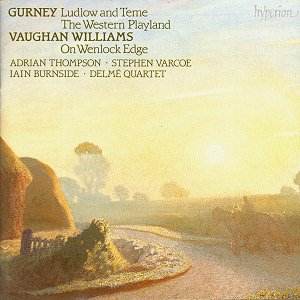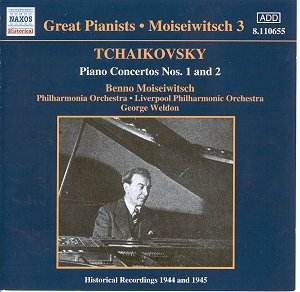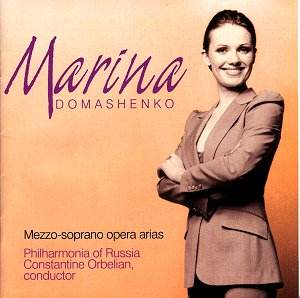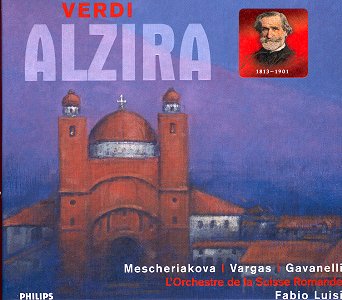 Composer: Ralph Vaughan Williams, Igor Gurney
Composer: Ralph Vaughan Williams, Igor Gurney
Works: On Wenlock Edge, The Western Playland, Ludlow and Teme
Performers: Adrian Thompson (tenor), Stephen Varcoe (baritone), Iain Burnside (piano), The Delmé String Quartet
Recording: 23, 24, 26 October 1989
Label: Hyperion CDA66385
Ralph Vaughan Williams and Igor Gurney occupy distinct yet interconnected spaces in the canon of English song, both drawing upon A. E. Housman’s poignant poetry in their respective cycles. Vaughan Williams’ On Wenlock Edge, composed in 1909, is perhaps the more celebrated of the two, a work that combines a rich harmonic language with a dramatic narrative arc. In contrast, Gurney’s cycles, particularly Ludlow and Teme and The Western Playland, composed in the shadow of World War I, reflect a more introspective, sometimes somber approach to Housman’s themes of love, loss, and the fleeting passage of time. This Hyperion release serves as a valuable exploration of these three significant cycles, highlighting their individual merits while also inviting comparison.
Adrian Thompson’s rendition of On Wenlock Edge showcases a tenor voice that grapples successfully with the emotional weight of Vaughan Williams’ score. His expressive phrasing, particularly in the climactic fifth song, Bredon Hill, is commendable; however, the tempo adopted in the latter stanzas feels excessively slow, risking an emotional stasis that detracts from the narrative’s urgency. When compared to Ian Partridge’s earlier EMI recording, Thompson’s interpretation reveals a more measured vocal approach that, while sensitive, occasionally falters under the weight of its own deliberateness. The emotional impact is palpable, yet it lacks the natural flow that Partridge brings to the same material, where a swifter tempo captures the poignant despair more vividly.
Stephen Varcoe’s interpretation of The Western Playland offers a refreshing contrast. His baritone voice resonates with a lighter, more lyrical quality that is particularly effective in conveying the simplicity and eloquence of Gurney’s settings. The performance of Loveliest of Trees stands out for its unaffected delivery, with Varcoe’s clear diction and warm tone creating an intimate connection with the text. The accompanying Delmé String Quartet and pianist Iain Burnside provide a sensitive backdrop that supports without overshadowing the vocal lines, a balance that is crucial in these intimate settings. Varcoe’s performance is marked by a nuanced understanding of the text, particularly in The Far Country, where his expressive delivery draws the listener into the reflective mood of the piece.
Technical aspects of the recording warrant attention as well. Hyperion’s sound engineering captures the ensemble with a somewhat restrained balance; the lower strings tend to recede into the background, which may reflect a concern for clarity in the vocal lines. Nonetheless, this choice sometimes compromises the overall texture, leaving intricate details of the ensemble work less pronounced than they might be. Comparatively, EMI’s recording of On Wenlock Edge achieves a more vibrant acoustic that enhances the interplay between voice and instruments. This disparity is particularly noticeable when examining the fortissimos in Bredon Hill, where a more prominent string presence could lend greater dramatic weight to the unfolding narrative.
The inclusion of Gurney’s cycles in this collection is a significant contribution to the available discography, especially given their relative scarcity in recorded form. Michael Hurd’s insightful liner notes provide context that enriches the listening experience, although a minor oversight in the text’s presentation does detract slightly from the overall quality of the documentation. Despite these reservations, the collection stands as an important resource for aficionados of English song, offering a glimpse into the emotional landscapes crafted by two composers navigating the complexities of early 20th-century life.
This release ultimately affirms the enduring appeal of both Vaughan Williams and Gurney, showcasing their unique voices while inviting listeners to contemplate the nuances of their interpretations. While Thompson’s performance may not eclipse Partridge’s iconic reading, Varcoe’s contribution is a highlight that deserves recognition within the broader context of English song. The recording is a worthwhile addition to the catalog, particularly for those drawn to the lyrical depth of Gurney’s work, making it an essential listen for enthusiasts of the genre.



